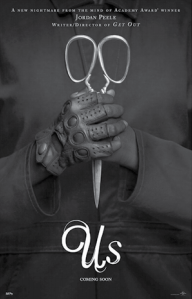Critipeg: Us
Currently in wide release

Peele’s follow-up Us might not be the crowd-pleaser Get Out his predecessor was, but it’s a major artistic step forward for a director who has gone from newcomer to sage with superhuman speed.
It’s a film that, while perfectly able to coast on surface-level story and thrills, is also dense with symbolic mysteries and paranoid political knots. If Get Out was Peele’s Dr. Strangelove, with its satirical heart on its sleeve, Us is his The Shining, sure to leave viewers puzzling over its subterranean secrets for years.
While it’s virtually impossible to discuss the film’s plot without spoilers, here are the bare bones: Adelaide (Lupita Nyong’o) vacations to the site of a childhood trauma with her husband (Winston Duke) and kids (Shahadi Wright Joseph and Evan Alex), where the family finds themselves victims of a home invasion perpetrated by people who seem to be their doppelgangers.
This is the setup for a pitch-perfect bit of narrative fishing by Peele, who baits the audience and reels them in slowly. With each revelation, he gives the viewer enough time to agonize over the “why” of it all, only to bring them a little closer to the answer and realize they were asking the wrong question.
All of this is done with expert balance of tone and tension. Peele’s understanding of his craft makes Us the rare horror film that’s truly, existentially terrifying. It’s easy to say “the air was heavy with tension,” but there are moments in Us that weigh a thousand pounds. That’s helped by composer Michael Abels, whose score works in tandem with Trevor Gates’ sound editing to weave an aural web that’s equal parts Psycho and cosmic, chaotic terror.
Nyong’o gives a dual performance that helps to further elevate the film. Adelaide’s shyness, paranoia and maternal resolve are all expressed physically. It’s not a silent performance, but she’s the film’s Joan of Arc. Her doppelganger is also a physical presence, whose movements exist in the Venn diagram overlap between a ballerina, a marionette and a spider.
Duke, who played a fierce but loveable badass in Black Panther, plays her oblivious dork of a husband with a goofiness that provides most of the movie’s much-needed breaks in the tension.
Peele still has the political on his mind, though this time around, he’s more interested in questions than statements. Us is, in one sense, holding a mirror up to a culture at a crossroads. It is concerned with oppression, revolution, violence, each feeding the other. It investigates the costs of material excess, or even modest comfort.
Even when that comfort is earned, does it still come at the expense of another? Peele doesn’t want to resolve these questions. He asks them, leaves the room and lets them haunt his audience.
Published in Volume 73, Number 23 of The Uniter (March 28, 2019)






